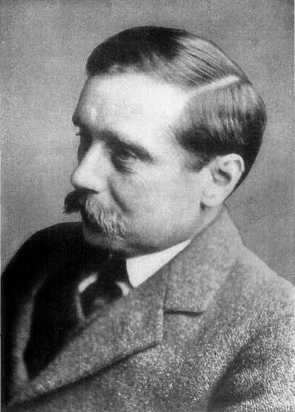The War of the Worlds is the must-read HG Wells but LESLEY FINLAY urges you to dip into Kipps, a great work that has plenty to offer the modern reader…
Herbert George Wells is well known as the father of science fiction. Quite rightly, The War of the Worlds is a masterpiece that still can terrorise today. Sadly, Wells, who led a somewhat chequered life in his pursuit of a philosophy by which to live, is one of those ‘controversial’ historical characters because of his interest in the theory of eugenics, on which National Socialism was based.
Let us hope that Wells’s reputation does not suffer for that in this age of political correctness, which has seen governments apologise for some of the worst moments of history committed by long-dead forefathers. His exploration of eugenics is a part of a large, interesting picture of his colourful life.
So for a bit of fun – and a great surprise – pick up Kipps, the author’s comic novel that has more than the odd nod to Charles Dickens.
This is a novel borne of an age in flux. After the death of Queen Victoria, the stuffy world of England was changed forever, coinciding as it did with a new century – always a moment in time where life and society is reassessed.
With the death of this most influential monarch, new theories and new social mores were being explored and tested. Life would never be the same again.
In Kipps, which was eventually published in 1905, Wells created Artie Kipps, a man trying to make his way in the world – first as a lowly draper’s assistant and secondly, as a man with a substantial inheritance.
Poor Kipps finds that both worlds are beset with rules of engagement that befuddle and depress.
There is a strict hierachy in the draper’s store that Kipps finds difficult to cope with. In a bid to improve himself, he takes evening classes, falling in love with the beautiful and unattainable Helen Walsingham. When Kipps discovers he is a rich man, he charges headlong into a society he does not recognise, which has its own code of rules that are impossible to follow.
The depiction of Kipps’s embarrassment is excruciating and marvellously done– bringing to mind David Brent, the ridiculous manager in the comedy The Office. Artie’s horror, embarrassment and fear of playing Miss Walsingham’s Anagram Game are only eclipsed by the devastatingly funny episodes in the hotel to which he runs away in despair.
The modern reader will observe that the world of Kipps is not too far away from us, even though we are told we are a fairer, more equal society. The success of social mobility still depends greatly on education. While Kate Middleton, whose parents are ‘in trade’, can grow up to marry the heir to the throne, David Beckham, the footballer, will always be the boy from Leytonstone, even though he may be the Prime Minister’s right-hand man when it comes to bidding for football tournaments.
Kipps’s acute embarrassment on how to behave demonstrates why Victorian society had to change – yet it shows, in some ways, how little it has. We are still obsessed with class but now there is a subtle change in that ‘the lower classes’ and ‘the upper classes’ are derided in equal measure by the ever-expanding middle class.
How interesting then that Wells decides to take the Hollywood ending for the troubled hero. So well drawn is Artie that the reader wills it.
Kipps is an entertaining study of a world long gone but one that will feel very familiar.




